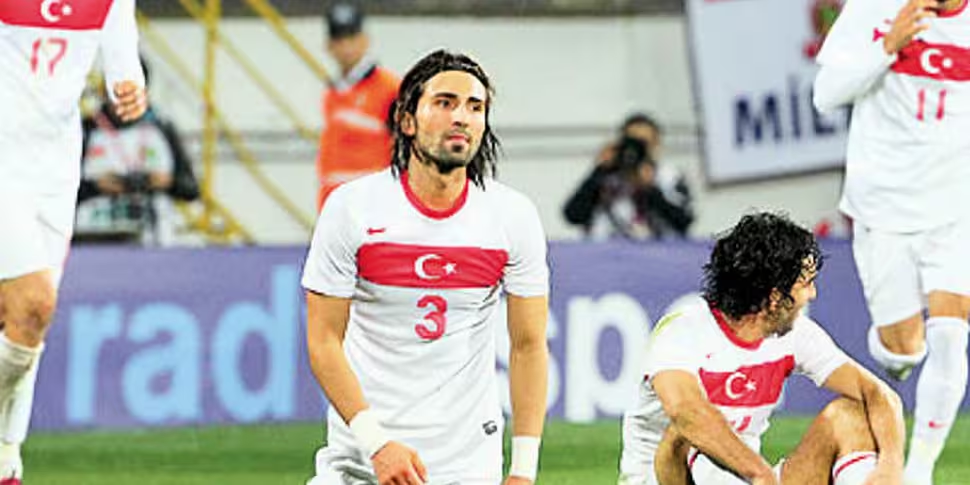For a country of over 75 million people, would it be fair to say that the Turkish national football team has punched below its weight to an extent? I would say yes.
Of course when you are discussing football development in a country, you cannot ignore socio-economic factors and it’s true that Turkey faces more challenges than Germany and France in that regard.
But aside from a surprise World Cup bronze medal in 2002 that has gone into folklore and a last-four place at Euro 2008, Turkey have failed to qualify for every other major tournament over the past decade (they are still in with a shout of a playoff place for next year’s World Cup though).
That being said, Turkey did not qualify for a major tournament between 1954 and 1996, so it can be argued that the past 20 years have been Turkish football’s golden era coupled with Galatasaray UEFA Cup win in 2000 proving to be a proud moment.
Yet how many world class players have Turkey produced in that period? Hakan Sukur, Nihat Kahveci and Tuncay Sanli (the only one of the trio who has not retired as of 2013) have had successful careers in their time, but none could be truly described as elite stars.
There is talent in Turkey’s current national pool where the likes of Atletico Madrid’s Arda Turan star. But if you look at the other recognisable names such as Nuri Sahin, Kerim Frei (formerly of Fulham), Hamit Altintop and Hakan Calhanoglu, they are all foreign born and developed at academies outside Turkish territory.
This abundance of mostly German-born players (Frei is an exception having been born and raised in Switzerland) is odd for a country of Turkey’s size and if you throw in other internationals like Mevlut Erdinc (France), former Bayer Leverkusen midfielder Yildiray Basturk (now retired), Sercan Sararer, Mehmet Ekici and Omer Toprak (all Germany) and it becomes clear that there is some level of reliance on the products of Germany’s endeavours at underage level.

Basturk in his 2002 pomp ©INPHO/Allsport
Germany’s youth system is among the best in Europe so the temptation is understandable from Turkey’s perspective. But it’s still a risk. For every Sahin and Calhanoglu, there is a Mesut Ozil or Ilkay Gundogan who turns down the prospect of representing the nation of their parents.
But Turkish clubs do not seem hugely bothered flustered about the situation.
Until 2010 Super Lig teams were only allowed to have eight foreign players under contract. The quota system was 6+2 (up to six foreign players could start a match with two more on the bench).

Read about Calhanoglu in Raf Diallo's Sunday Scouting Report
But that summer the Turkish Football Clubs’ Union - which represents league clubs - pressed for less stringent foreign player quota of 6+4 (up to six foreign players allowed to start league matches and four more on the bench on any given matchday).
The Turkish Football Federation (TFF) ultimately settled on 6+2+2 quota which allowed a total of 10 foreign players. Only six could take to the field, two more were allowed to start from the bench and the remaining two were barred from the matchday squad. But significantly the restriction on the latter did not apply to UEFA Champions League and Europa League matches.
But sensing that there are major problems when it comes to producing players, the TFF made the rules even more stringent at the start of this season. The new quota is now 6+0+4 which allows just six non-Turkish players in the matchday squad, while the remaining four foreign players must be left out. The advantage for Turkish players is that five must be fielded from the start of any match.
It is not economical for clubs to have four mostly well-paid foreign players regularly languishing outside the matchday squad and it has angered the likes of Galatasaray who have filed a lawsuit against the TFF with the European Court of Human Rights as a means of reversing the restrictions.

They want a rule similar to other leagues in Europe where players born within the EU are not included in the foreign category. Even players like Didier Drogba and Emmanuel Eboue who play for African nations but also happen to be EU citizens would have no restrictions imposed on them.
But for now the TFF have not budged and in fairness to them, they need to act for the good of their national game.
A significant number of Turkey’s U20 World Cup squad that lost 4 – 1 to France in a tournament on home soil were foreign born and the TFF will want to increase the pool of players produced within Turkey’s border.
But that is only part of the problem. While opportunities open up for Turkish players in the Super Lig, more work is needed when it comes to the more long-term task of developing players, especially when it comes to increasing the number of qualified youth coaches.
The English media often rightly point out that England only has a fraction of the qualified coaches that currently exist in countries like Spain and Germany. It’s a complaint in Ireland as well.
While Germany and Spain have over 10 times the number of qualified coaches than England, Turkey’s situation is even more bleak with about one-tenth of England’s tota. That is one of the main area where they need to catch up.









